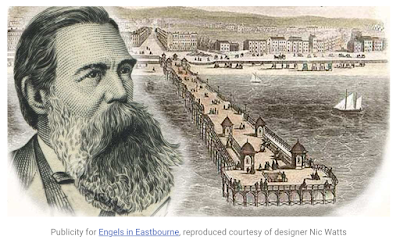Wednesday, November 25, 2020
Publicity for Engels in Eastbourne, reproduced courtesy of designer Nic Watts
Engels’ historical recovery of the millenarian preacher Thomas Müntzer – the leading educator, agitator and organiser and prophet of revolution amid the Great Peasant War of 1525 – was itself symbolic of the wider revolution in historiography he helped to foment. Before he was executed by the princes with the support of Martin Luther, Müntzer had bravely declared while being tortured that he believed ‘all property should be held in common’ (Omnia sunt communia).
Engels’ lifelong commitment to revolutionary history is further underscored by the fact that he planned to write a history of Ireland. In May 1895 Engels retired to his favourite place of rest, the southern seaside town of Eastbourne. Even at this late hour, already weakened by the cancer that would kill him in a few months, Engels found time while helping prepare Karl Kautsky’s Forerunners of Modern Socialism for publication, to attempt the final completion of the new edition of his Peasant War that would recognise 1525 as ‘the cornerstone of Germany’s entire history.’ Engels felt it critical to lay stress on the central role of the journeymen-weavers. These ‘declassed, almost pariah-like, elements’ were a central basis of what became ‘the pre-proletariat, which in 1789 made the revolution in the suburbs of Paris and which absorbed all the outcasts of feudal and guild society.’ Everyone inspired today by the tradition of radical history, people’s history and history from below, should take the opportunity of #Engels200 to acknowledge the intellectual debt owed to Engels, for whom the lowest stratum of society – the outcasts and pariahs – deserve and demand to be recognised and recorded as ‘the chief element.’
Christian Høgsbjerg is a Lecturer in Critical History and Politics in the School of Humanities at the University of Brighton. He is the author of C.L.R. James in Imperial Britain (Duke University Press, 2014) and the co-editor with David Featherstone of The Red and the Black: The Russian Revolution and the Black Atlantic (Manchester University Press, forthcoming). He is a member of the Socialist History Society committee and together with Cathy Bergin is co-organising a forthcoming conference, Engels in Eastbourne.
Subscribe to:
Post Comments (Atom)


No comments:
Post a Comment